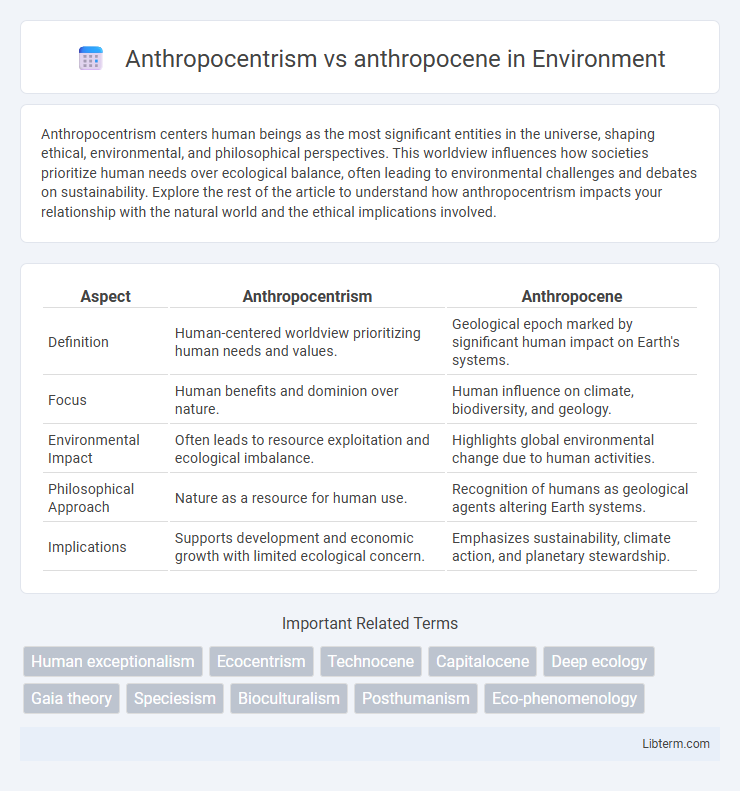Anthropocentrism centers human beings as the most significant entities in the universe, shaping ethical, environmental, and philosophical perspectives. This worldview influences how societies prioritize human needs over ecological balance, often leading to environmental challenges and debates on sustainability. Explore the rest of the article to understand how anthropocentrism impacts your relationship with the natural world and the ethical implications involved.
Table of Comparison
| Aspect | Anthropocentrism | Anthropocene |
|---|---|---|
| Definition | Human-centered worldview prioritizing human needs and values. | Geological epoch marked by significant human impact on Earth's systems. |
| Focus | Human benefits and dominion over nature. | Human influence on climate, biodiversity, and geology. |
| Environmental Impact | Often leads to resource exploitation and ecological imbalance. | Highlights global environmental change due to human activities. |
| Philosophical Approach | Nature as a resource for human use. | Recognition of humans as geological agents altering Earth systems. |
| Implications | Supports development and economic growth with limited ecological concern. | Emphasizes sustainability, climate action, and planetary stewardship. |
Understanding Anthropocentrism: Definition and Origins
Anthropocentrism is a philosophical viewpoint that places humans at the center of moral consideration and values human interests above other species, originating from Western intellectual traditions dating back to the Enlightenment. This perspective shapes environmental ethics by framing nature primarily as a resource for human use, contrasting with the Anthropocene concept, which denotes a geological epoch characterized by significant human impact on Earth's ecosystems. Understanding anthropocentrism reveals the roots of environmental challenges by highlighting how human-centered thinking contributes to ecological degradation and emphasizes the need to rethink humanity's relationship with nature.
What is the Anthropocene? Epoch Overview
The Anthropocene is a proposed geological epoch marked by significant human impact on Earth's geology and ecosystems, distinguishing it from the Holocene. This epoch is characterized by profound changes such as increased carbon emissions, widespread biodiversity loss, and altered sedimentation patterns due to industrialization and urbanization. Anthropocentrism, in contrast, is a philosophical viewpoint that centers human beings as the primary agents in interpreting and shaping the environment, often influencing the narratives surrounding the Anthropocene.
Historical Development of Human-Centered Worldviews
Anthropocentrism emerged during the Enlightenment as a dominant worldview, emphasizing human superiority and control over nature, shaping environmental policies and ethical frameworks for centuries. The Anthropocene concept, introduced in the late 20th century, critiques this human-centered perspective by highlighting humanity's profound geological impact on the Earth system. This shift from anthropocentrism to Anthropocene thinking marks a historical evolution in understanding human-nature relationships, urging a more integrated and responsible approach to planetary stewardship.
Environmental Impacts of Anthropocentrism
Anthropocentrism, the belief that human beings are the central or most significant entities in the world, drives environmental degradation by prioritizing human needs over ecological balance. This worldview contributes to deforestation, biodiversity loss, and climate change, exacerbating the Anthropocene epoch characterized by significant human impact on Earth's geology and ecosystems. Environmental consequences such as habitat destruction and pollution are intensified by policies and practices rooted in anthropocentric values.
The Anthropocene: Human Influence on Earth's Systems
The Anthropocene marks a geological epoch defined by significant human impact on Earth's systems, including climate change, biodiversity loss, and altered biogeochemical cycles. This epoch highlights how industrialization, deforestation, and urbanization have transformed atmospheric composition and disrupted natural processes. Understanding the Anthropocene underscores the urgency of sustainable practices to mitigate long-term ecological consequences driven by anthropogenic activities.
Anthropocentrism and Modern Environmental Ethics
Anthropocentrism positions humans as the central and most significant entities in the universe, prioritizing human interests and values over ecological concerns. In modern environmental ethics, this viewpoint is critically examined as it often leads to environmental degradation by justifying exploitation of nature for human benefit. Contemporary ethical frameworks increasingly challenge anthropocentrism by advocating for intrinsic value in non-human entities and promoting sustainable coexistence within the Anthropocene epoch.
Contrasting Philosophies: Anthropocentrism vs. Ecocentrism
Anthropocentrism centers human beings as the dominant entity in the universe, valuing nature primarily for its utility to human needs and desires. In contrast, ecocentrism emphasizes the intrinsic value of all living organisms and ecosystems, advocating for a balanced coexistence where human activities must respect ecological limits. This philosophical opposition shapes debates on environmental policy, with anthropocentrism often prioritizing economic growth and resource exploitation, while ecocentrism promotes sustainability and biodiversity preservation.
The Role of Technology in Shaping the Anthropocene
Technology drives the Anthropocene by altering ecosystems through innovations in energy, agriculture, and transportation, significantly increasing humanity's environmental footprint. Advanced technologies such as remote sensing and big data enable better monitoring and management of Earth's systems, highlighting both the scale of anthropogenic impacts and potential solutions. This technological influence challenges Anthropocentrism by demonstrating the interconnectedness of human and natural systems, urging a more integrated ethical approach to sustainability.
Rethinking Humanity’s Place in the Natural World
Anthropocentrism positions humans as the central and most significant entities in the natural world, often leading to environmental exploitation and disregard for ecological balance. In contrast, the Anthropocene concept highlights humanity's profound impact on Earth's geology and ecosystems, urging a rethinking of humanity's place as an integral part of complex environmental systems rather than dominators. This shift calls for embracing sustainability and interconnectedness to restore harmony between human activities and planetary health.
Toward a Sustainable Future: Moving Beyond Anthropocentrism
Moving beyond anthropocentrism involves recognizing the intrinsic value of all species and ecosystems, not just human interests, to address the ecological crises emblematic of the Anthropocene. Emphasizing sustainability requires integrating ecological ethics that prioritize biodiversity conservation, climate resilience, and habitat restoration. This shift supports policies and practices fostering harmony between human development and planetary health, ensuring a viable future for diverse life forms.
Anthropocentrism Infographic

 libterm.com
libterm.com